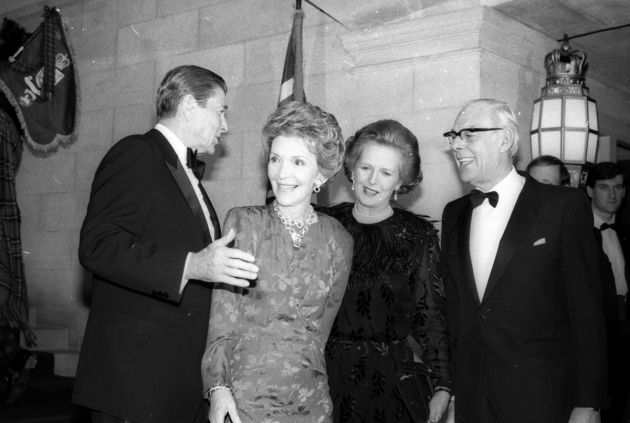Christian worldview influenced Margaret Thatcher

Former British prime minister Margaret Thatcher is being remembered for the great influence her Christian faith had on her actions. She was prime minister from 1979-1990.
The conservative leader, known as "The Iron Lady" who died on April 6 at the age of 87, grew up in the Methodist Church.
Her policies have left her with a divided legacy in the United Kingdom where she is both loved and loathed for the free market spirit she embodied and established after years of socialist rule.
Thatcher's burial service will be held at London's St. Paul's cathedral on April 17.
Mark Toolley, a Methodist author and president of a conservative think tank called the Institute on Religion and Democracy, wrote this week of the influence her religious upbringing had on her political views in the American Spectator.
"Margaret Thatcher was forever the thrifty Methodist's grocer's daughter of Grantham," said Toolley. "Her father was both lay preacher and Conservative Party stalwart."
Toolley writes that although Thatcher converted to her husband's Anglican faith, her world view was shaped by a post-Victorian Methodism which emphasized "personal faith, unceasing diligence, exacting self-discipline, and personal exertions for social improvement based on rectitude."
"Thatcher was an unapologetic if practical political moralist, and Methodism made her so," he said.
Washington Post opinion writer, Michael Gerson, called her the "moral capitalist."
He said that in her formative years "she developed a critique of democratic socialism both rowdy and libertarian."
"But alongside these libertarian beliefs, or perhaps beneath them, ran a strong religious current. Thatcher described Methodism as her '"anchor of stability.'"
Gerson adds, "Thatcher's primary concern was not the heroic Christian virtues but the useful Victorian ones - 'thrift, self-discipline, responsibility, pride in and obligation to one's community.'
"While these can come from a variety of non-religious sources, Thatcher found it 'difficult to imagine that anything other than Christianity is likely to resupply most people in the West with the virtues necessary to remoralize society in the very practical ways which the solution of many present problems requires.'"
Thatcher's Christian world view and how it came about was expressed publicly during two landmark events. The first was an interview she conducted with the United Kingdom's Catholic Herald newspaper in 1978.
Thatcher told the Herald that she and her sister Muriel were not allowed to play games or go to the cinema as children. They also had to attend church three times each Sunday.
However, Thatcher said her Methodist church was not just a place to go on Sundays.
"There were a lot of things during the week which one attended," she said. "Methodism is a pretty practical faith; there were the mothers' sewing meetings and the guilds for young people."
Despite becoming an Anglican after marriage, Thatcher still admired the Methodist Church and held on to the things she learned from her upbringing in the religion.
She appreciated the evangelical and missionary fervor of the Methodists.
"I must say I was very much attracted to the work they did because they could really see results", said Thatcher in the 1978 Herald interview.
She called Methodism "the most marvelous evangelical faith" and expressed a love for its music and an appreciation for its informality.
However, Thatcher also desired the teaching and formality of the Anglicans.
"So throughout my life I have always felt the need for both things," she said.
In addition to the interview with the Herald, Thatcher gave another memorable talk which revealed her world view and the sway Christianity had on her politics.
This was the speech she gave in 1988 to the General Assembly of the Church of Scotland.
She began the speech by saying that she was speaking personally as a Christian as well as a politician.
After that, the prime minister quoted a statement she had come across that read, "Christianity is about spiritual redemption, not social reform."
Thatcher noted, however, that both Christians and non-Christians believed it was important to help their fellows.
Thatcher then went on to state what she believed to be the distinctive marks of Christianity, stemming from the spiritual and not the social side of life.
She noted that the key elements of belief centered around personal choices: that men could choose between good and evil and that the truth that they were made in the image of God influenced those choices.
Thatcher also noted that a key tenet of Christianity was that Jesus Christ chose to lay down his life so that people's sins could be forgiven.
Thus, in the speech she did agree that being a Christian emphasized "the sanctity of life, the responsibility that comes with freedom, and the supreme sacrifice of Christ" more than social reform.
However, after noting that Christianity did stress spiritual issues, Thatcher told the assembly how she believed Christian faith related to public policy.
Thatcher said that the Old Testament emphasized the need for love and for laws and that the New Testament also stressed love and the kingdom of God.
"I believe by taking these key elements from the Old and New Testaments, we gain a view of the universe, a proper attitude to work, and principles to shape economic and social life," she said.
Jim Denison, founder of the Denison Forum on Truth and Culture, quoted Thatcher as saying, "I believe in what are referred to as Judeo-Christian values. Indeed, my whole political philosophy is based on them."
Denison said that he believes Thatcher "was one of the pivotal personalities of the 20th century."
"Her abiding significance in my view is not the political reforms she led but the connection between democracy and morality she championed," he said.